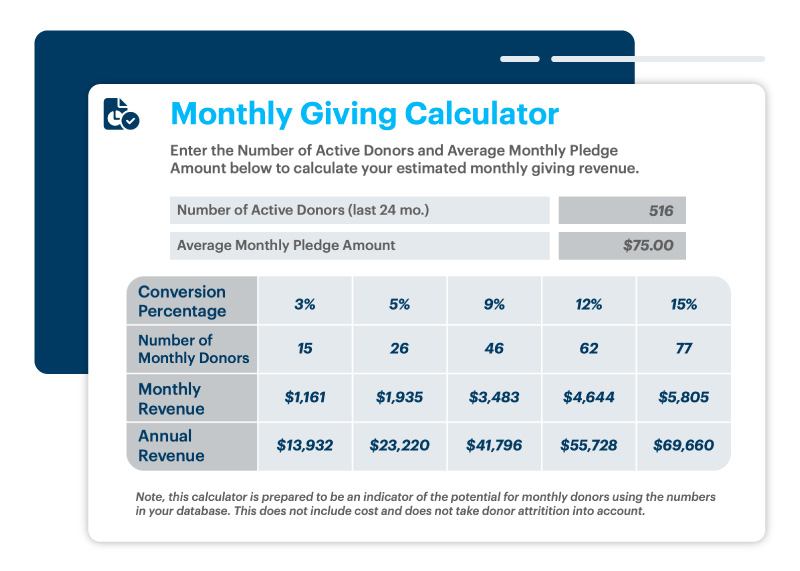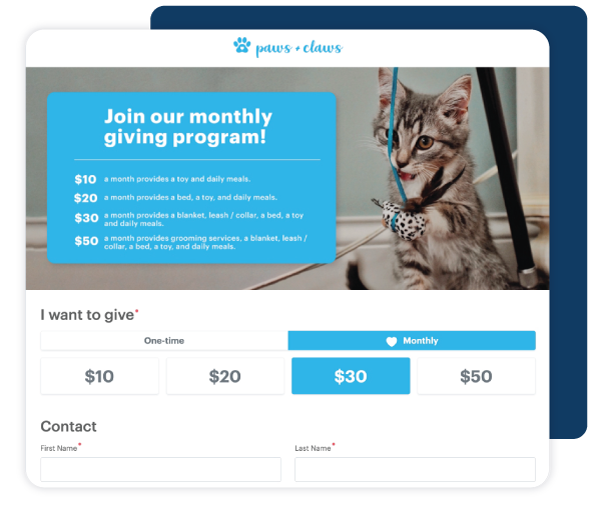Seventy percent of nonprofit organizations say they struggle to get their board members to participate in fundraising activities – a number that’s on the rise, according to Nonprofit PRO.
The nonprofit landscape is constantly changing, and to provide the best outlook for your organization, it’s important to stay on top of industry trends while also keeping your board well-informed. Data-driven decisions will help your governing body make hard choices when resources need to be carefully allocated to keep your nonprofit thriving.
One fundraising trend that continues to gain traction is recurring giving. While online giving and one-time gifts recently decreased by 12%, monthly giving increased by 11%.
If you don’t have a monthly giving program yet, or have a stale program that needs to be revived, this is an excellent strategy to talk through with your board. If you have your work cut out for you when it comes to selling them on a robust monthly giving program, we’re happy to introduce these reports and metrics you can use as the basis for your argument.
4 Ways to Sell Your Board on Monthly Giving
1. Small-dollar recurring gifts are lucrative
Your board may be concerned that the overhead cost of a monthly giving program is too high for the small-dollar donations that it brings in. Fortunately, we have the right metrics and tools to put this worry to rest.
Monthly Giving Calculator
Use a monthly giving calculator like the one found in our Monthly Giving Success Kit to set expectations around how much money you can reasonably hope to raise through a monthly giving program.
Ex. Using a donor base of 1,000 donors, if you hope to get just 3% of your donor base into your monthly giving program with an average gift of $20 this is what you can expect.

Hopefully, by using your real donor numbers and this monthly giving calculator, you can help your board to fully comprehend what a difference small-dollar donors can make when it comes to meeting your fundraising goals.
Reference Report: If you already have a monthly giving program, use a report like DonorPerfect’s Monthly Giving report to see the lifetime value of your average monthly donor. Compare their lifetime value to the lifetime value of your average one-time donor to demonstrate how important these supporters can be. If you do not yet have a monthly giving program, then you can use the monthly giving calculator to gather a realistic view of what a monthly donor’s lifetime value will be.
2. Overhead costs will diminish
With the right tools and the right CRM, the cost of running a scalable monthly giving program is extremely manageable considering the amount of automation you can enjoy.
There’s no data entry required
With tools like DonorPerfect’s online forms and monthly giving processor, there is no need for data entry of any kind. Donors will select to make a recurring gift through an online form. Then, the pledge and first gift record will automatically download to DonorPerfect. Each month (or at a frequency you select) after that, the donor’s credit card or bank account will automatically process the recurring gift.
Credit card information can be updated automatically
DonorPerfect’s gateway also features a credit card updater, meaning if a donor’s credit card has been canceled or is expiring, the card information will automatically be updated so your monthly gifts will continue to process.
Email receipts can be sent automatically
Finally, DonorPerfect’s automated features also include receipts. Your donors will be emailed a receipt each time a gift is processed, thanking them for their donation so you can continue to build a relationship with your most loyal donors.
This eliminates data entry, calling donors for updated card information, processing donations, and receipting from your staff’s plate, ensuring you have the capacity to handle a monthly giving program comprised of 50 donors or 5,000 donors.

Looking for more tips on streamlining your work efforts in DonorPerfect? Schedule a training session for you and your team to make the most of your virtual fundraising experience.
Reference report: If you need a report to demonstrate how effective and low-cost a monthly giving program really is, take a look at a report like DonorPerfect’s Solicitation Analysis report. This report shows what your net revenue is for each campaign, by showing your expenses side by side with your raised funds. While a high-impact event may look like it brings in the big bucks, when you compare it to the money spent to host, a monthly giving program with simple emails and letter solicitations may suddenly look very appealing.
3. Monthly donors make major donors
Board members may be reluctant to back a big push towards monthly giving for fear that it is not the most effective fundraising strategy or use of administrative dollars. After all, it’s widely known that 80% of revenue comes from 20% of donors. Those 20% are not your monthly donors, they’re your major donors. While this still holds true, major donors are not made overnight. Almost half of all major donors have a relationship with an organization for an average of 5 years. Monthly giving is a great avenue to employ to build a relationship with donors, and it’s one of the best strategies you can use to retain a donor year after year.

DonorPerfect’s monthly giving users boast a 90% donor retention rate!
Reference report: Try a giving history report like DonorPerfect’s Giving History with Donor Profile to determine the average length of time it takes your organization to cultivate a major donor. This will help to illustrate that major donors are not made overnight, and a monthly giving program is a valuable and worthwhile investment to establish a productive source of future potential major donors.
4. Monthly gifts are appealing, especially to young donors
Younger generations, namely Millennials and Gen Z, prefer to give recurring donations. Giving USA’s “Giving By Generation” survey found that 58% of Millenials and 62% of Gen Z donors said they prefer to make monthly donations over one-time gifts. Considering these generations will comprise your future major donors, establishing a strong relationship with them now through a monthly giving program is an effective way to build your potential pool of donors in the years to come. This is a great way for young donors to see that they can make an impact in their community in ways that are important to them.
Reference report: There are a lot of giving trend reports you can reference to see what is gaining popularity with your target audience. The Giving By Generation report is one of many that can help your organization glean valuable information to help you build informed campaign strategies.
Monthly giving generates board involvement
Even though many organizations struggle to get their board members to participate in fundraising efforts, a monthly giving program is an ideal way to encourage participation as it takes off the pressure of asking for major gifts.
A fundraising appeal asking for $20 a month or a $10,000 check requires a lot of the same components, but it sure feels a lot less intimidating to ask someone for a smaller and still highly effective gift. While board members are great at a lot of things, for many of them, fundraising is a new experience. This is a great way to introduce them to the intricacies of fundraising without throwing them in the deep end too soon.
Monthly giving is a growing trend, and it’s an important and effective giving option for your donors. Give your board members the information they need to see that this is an essential fundraising strategy your nonprofit needs to meet your goals and make your mission happen.






